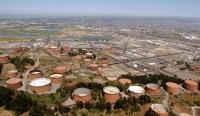Chevron may be seeking exemption from state environmental laws for its refinery rebuilding project
By Paul Rogers progers@mercurynews.com
Posted: 09/06/2010 07:00:00 PM PDT
Refinery in Richmond Calif., Wednesday May 17,2006. (Bob Larson/Contra Costa Times/KRT)

One of Northern California's largest polluters may be trying to orchestrate a last-minute deal with lawmakers in Sacramento to evade state environmental laws, potentially increasing its toxic emissions and skirting two court rulings.
For five years, Chevron has been trying to rebuild and upgrade its Richmond refinery. Environmental and community groups filed suit, arguing that the company was concealing plans to process heavier grades of crude oil, which can increase pollution.
A judge agreed last year, halting the construction work. In April, the state First District Court of Appeal also ruled against Chevron, saying the company's environmental impact report is "inconsistent and obscure" and fails to clearly tell the public how the project would affect refinery emissions.
Now environmentalists and some legislators are sounding the alarm in Sacramento, saying Chevron's lobbyists in the Capitol have been quietly trying to craft a deal to give the company -- America's third largest, with $10.4 billion in profit last year -- an exemption from the state law that requires environmental studies of major projects.
"The courts have said, 'You didn't follow the law. You are going to be polluting communities a whole lot more than you are disclosing,' " said Tina Andolina, legislative director for the Planning and Conservation League, a Sacramento environmental group. "This company broke the law, and now they are coming to ask for an exemption to the law they broke."
Three weeks ago, Assemblyman Pedro Nava, D-Santa Barbara, sent a memo to state lawmakers warning them that Chevron was seeking the exemption. "Don't give it to them!" his memo said.
Nava, chairman of the Assembly environmental safety committee, said he's most concerned that Chevron, which has handed out $4.1 million in campaign donations since 2009 to state lawmakers, will push through a "budget trailer bill" providing the exemption. Such bills often are written in secret by legislative leaders, introduced only minutes before being attached to a final vote on the state budget, without hearings or public scrutiny.
"If somebody is going to try to do the dirty deed, that's where they would sneak it in," Nava said. "The result would be more children with asthma and tremendous impacts to public health."
Chevron officials did not directly answer when asked by Bay Area News Group if they are seeking the exemption.
"We've reviewed a number of options, and at this point nothing is concrete," said Brent Tippen, a Chevron spokesman.
Asked if the company would refuse to accept such an exemption, Tippen added in an e-mail: "Speculation on any alternative means of resolving the outstanding issues would be premature." Tippen confirmed that the deadline for Chevron to appeal its case to the state Supreme Court has passed, and that the oil giant did not appeal.
In an interview Friday, U.S. Sen. Dianne Feinstein said she has not followed the case closely, but added: "If there's a court finding against Chevron and they didn't appeal, it seems to me they ipso facto accept the judgment."
In recent years, state lawmakers have made numerous attempts to bypass the state law that requires environmental impact reports. That law, the California Environmental Quality Act, is criticized by developers and industry as time-consuming and costly. Community groups and environmentalists say it provides the public key information about how much traffic, noise and pollution large new projects -- from highways to housing developments -- will create, resulting in requirements to offset those effects.
Last fall the Legislature granted a waiver from the law to billionaire developer Ed Roski Jr., to build a 75,000-seat NFL stadium in City of Industry, near Los Angeles. Last month, lawmakers voted down a bill sponsored by Walmart that would have waived environmental review of new big box retailers moving into vacant stores, following Bay Area News Group stories about it.
The Richmond refinery sits on 2,900 acres adjacent to San Francisco Bay. Chevron has been trying to replace aging equipment at the facility to refine a wider range or crude oil and produce more California-grade gasoline.
Built in 1902 by Standard Oil, the refinery ranks as the third largest source of toxic pollution in Northern California, having released 604,483 pounds of chemicals last year, including 392,038 pounds of air emissions like beneze, lead, ammonia, zinc, acids and other chemicals through its smokestacks and other equipment, according to EPA records. The plant also is the single largest source of greenhouse gas emissions in California, having put out 4.8 million metric tons in 2008, according to the state Air Resources Board.
Tippen, of Chevron, said the company is in mediation talks with environmental groups, state and local officials, and labor leaders -- who are pushing for the more than 1,000 idled construction jobs at the site to be restarted. The main mediator is Assemblyman Mike Feuer, D-Los Angeles. This past summer, Chevron donated $1,000 to his Assembly campaign.
"This is David vs. Goliath," said Andolina of the Planning and Conservation League. "Chevron's got very deep pockets. They are holding the jobs hostage and getting people riled up. We're worried. If they had done their job right the first time the refinery would be up and running."
Contact Paul Rogers at 408-920-5045.
